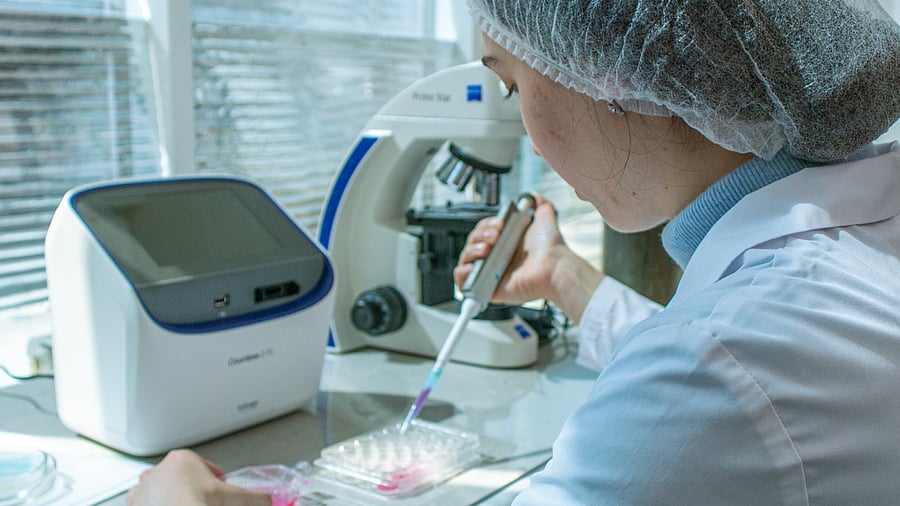
Representative image for Biotechnology
Credit: Special Arrangement
Biotechnology, as the term suggests, combines biological sciences and technology. It’s a subject available for study both in science and technology. A couple of decades ago, biotechnology was considered a sunrise sector; now, it’s on a strong footing, employing many scientists and technologists.
Biotechnology is preferred by those with a research orientation and an experimental mind.
This subject focuses on using biological knowledge relating to living organisms, genes, and cells to develop useful products, processes, and services, including new medicines and therapies, cloning, genetically modified foods, and enhanced crops. Biotechnology encompasses various laboratory techniques that alter and manipulate molecules, genes, and cells. It often involves using biological processes to bring new products or add value to the existing products used for consumption, treatment, etc. We can see how useful the study of biotechnology can be.
Biotechnology as a full-fledged subject can be taken up for study after 10+2. There are two options at this level: BSc Biotechnology or BTech Biotechnology. BSc - Biotechnology is available at many universities and various colleges affiliated with them. Common University Entrance Test (CUET) UG can be your gateway to this course. A few universities and institutes have their own selection process.
For admission to B.Tech. (Biotechnology) the most common route is JEE Mains. Candidates qualifying in this are offered admission at IITs, NITs and other participating institutions. Private institutes may follow a different route.
The major entrance examinations for admission to MSc Biotechnology are- CUET PG and Graduate Aptitude Test- Biotechnology (GAT-B). One thing to be noted here is that a bachelor’s degree in biotechnology is not necessary for a master’s degree in the subject.
To illustrate, candidates having studied physics, chemistry, botany, zoology, biochemistry, microbiology, agricultural/veterinary/fisheries sciences, and pharmacy at the undergraduate level may seek admission to MSc Biotechnology. For MTech offered at IITs and various other all-India institutes, admissions are made based on scores in IIT JAM and also GATE in some cases. For others, one has to check on a case-to-case basis.
Though biotechnology is a branch of life sciences, it offers various specialisations such as plant, environmental, food, animal, industrial, and medical biotechnology.
The government of India has established several institutes to promote higher education and research in biotechnology. These include the National Institute of Immunology and National Institute of Plant Genome Research at New Delhi; the National Centre for Cell Sciences at Pune; the National Brain Research Centre at Manesar; the National Institute of Biomedical Genomics at Kalyani; Transnational Health Science and Technology Institute at Faridabad and Centre for DNA Fingerprinting and Diagnostics at Hyderabad.
The National Agri-Food Biotechnology Institute at Mohali and the National Institute of Animal Biotechnology at Hyderabad have study and research programmes in specialised branches of biotechnology, as suggested in their names.
The Biotechnology Industry Research Assistant Council (BIRAC) is another prominent institution that promotes biotech enterprises. It has different schemes for helping start-ups and enterprises in the biotech sector incubation, ideation to early/late stage, equity funding and product commercialisation.
The private sector is equally active in investing in biotechnology-related industries. Thus, biotechnology work opportunities exist in the public and private sectors. Different government entities, from time to time, keep advertising for research associates and scientists. Research in different areas of biotechnology can also be pursued at laboratories established by the Council of Scientific and Industrial Research (CSIR) and the Indian Council for Agricultural Research (ICAR).
Master degree holders (MSc or MTech) in biotechnology have better prospects. The area they get to work will depend upon the branch of biotechnology they’ve specialised in.
Industrial biotechnologists are needed in different kinds of industries, fertilizer, pesticides, petrochemicals, etc. Food biotechnology is useful in food processing, preservation, analysis, waste reduction and quality control, offering matching work opportunities.
Medical biotechnology is crucial in developing new treatments and therapies for various diseases and health conditions. A study of this branch of biotechnology may let you work with pharma companies, health food and supplements manufacturers, clinical research companies, big hospitals, etc.
Plant biotechnology deals with plant physiology, plant tissue culture, and plant pathology, and it looks into complex interactions between plants and their environment. This specialisation is focused on ensuring food security, sustainable agriculture and enhancing crop quality for high yield.
Bioinformatics has a close association with biotechnology. It stands at the intersection of biology, computer science and mathematics. Bioinformatics is used in medical research by analysing large sets of genetic and other biological data to identify new therapeutic targets and develop more effective disease treatments. Bioinformatics can help to develop personalized treatments for patients based on their genetic makeup, leading to more targeted and relatively effective treatments.
Some of the big companies having roles in biotechnology are Amul, Indian Oil, Reliance Industries, Godrej Industries, Dr Reddy Laboratories, Biocon, GVK Biosciences, Rallis India, Ion Exchange India, Jubilant Lifesciences, and Praj Industries, among others.
Many universities in developed countries are considered Centres of Excellence for education in biotechnology. Some of these offer partial or full scholarships. Biotechnologists have universal demand and can look for opportunities to work anywhere in the world.